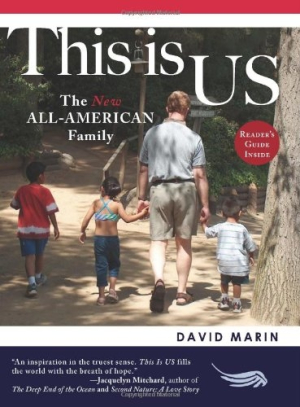This is Us
The New All-American Family
Good books often give us some laughs and/or add to our knowledge about a relatively unknown subject. In addition to satisfying on both of those counts, this story had to be told—as a form of therapy and pride for its author, but mostly to hold up a mirror to our nation’s incompetent social structure, in which far too many children are considered disposable.
Like any new parent, David Marin pulls the narrative equivalent of adorable photos from his wallet. His four-year-old daughter’s recitation of the alphabet: “A-B-C-D-E-F-G, H-I-J-K-I’m a little pea,” or the fact that his youngest prefers to be called “Shrek” and carries an ID with that name from a family visit to an aquarium.
In some ways, his three young children are typical, growing out of their shoes by the day and delighting in McDonald’s. Their memories, however, distinguish them: Nightmares in which “robbers,” aka cops and social workers, repeatedly take them away from each other and the people they love; how rubbing food on your lips can keep hunger at bay for a while longer; and that taking lettuce from the pet rabbit’s cage when no one is looking is one way to survive. When the two-year-old messes his diaper for the first time in their new home, his four- and six-year-old siblings stand between him and the author, their new dad, to protect their brother from the wrath (and abuse) they’ve come to expect.
As a single adoptive parent of foster children in California, Marin sees his sacrifices as few, and his rewards innumerable: Instead of golfing seven times a month, he’ll golf seven times a year. He is unapologetic about his desire to not be alone as he ages, or, as a light-skinned, redheaded man, to celebrate his late father’s Puerto Rican heritage by adopting Latino children.
Marin’s frustration with “the system” over the three years it takes to finalize his dream, plus his increasing horror at learning the details of what his beloved “angels” endured, structures a mostly discouraging tale. A chapter titled “Walnut” tells about the social worker who makes a surprise visit, and, while completely ignoring the children, offers to buy his daughter’s walnut bedroom furniture because she’s been looking all over “for a set just like it.” The stats about prospective parents who begin the foster-cum-adoption process and ultimately burn (or opt) out are chilling.
Throughout his story, Marin receives much-needed emotional support, advice, and help from a woman he dates, who is a mother, as well as his own mother and sisters. He also gets released from a good-paying job and is forced to relocate after he makes public his plans to adopt. He subsequently sues his employer.
When a judge finally grants the new family’s long-awaited adoptions, he says to Marin, “There are people out there who would try to save their sperm or hire a surrogate mother … But you went out and found kids who needed a home, and I am impressed with that.” It’s impossible not to be.
This is US is a celebration of difference. It will educate all prospective adoptive parents about what to expect from the adjustments required in building their new families, but will be especially valued by those willing to welcome the neediest children.
Reviewed by
Julie Eakin
Disclosure: This article is not an endorsement, but a review. The publisher of this book provided free copies of the book to have their book reviewed by a professional reviewer. No fee was paid by the publisher for this review. Foreword Reviews only recommends books that we love. Foreword Magazine, Inc. is disclosing this in accordance with the Federal Trade Commission’s 16 CFR, Part 255.

